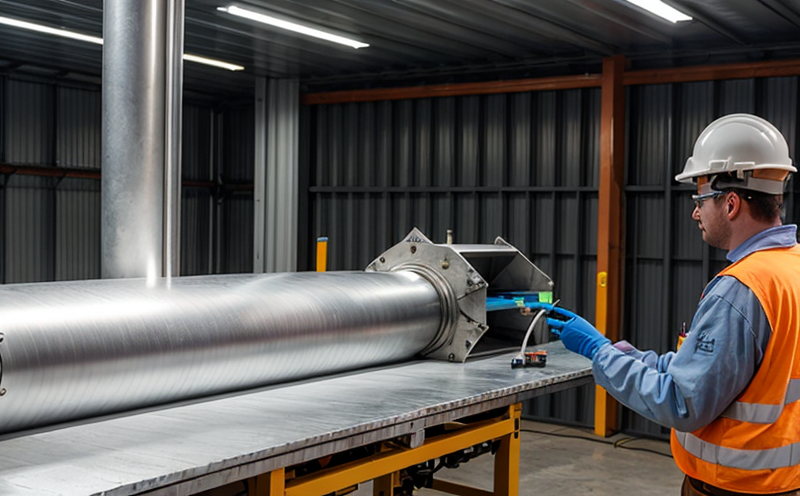ISO 75 Heat Deflection Temperature Testing of Plastics in Renewable Systems
The ISO 75 heat deflection temperature (HDT) test is a critical procedure used to assess the thermal and mechanical properties of plastics, particularly important for renewable energy applications. This test evaluates how materials perform under load at different temperatures, ensuring that they meet design specifications and maintain structural integrity in real-world conditions.
In the context of renewable systems, such as photovoltaic panels, wind turbine components, and solar water heaters, the durability and reliability of materials are paramount. The ISO 75 test helps to ensure that plastics used in these applications can withstand high temperatures without deforming or breaking, which is crucial for long-term performance.
The test involves subjecting a specimen of plastic material to a load at a specified temperature while measuring the deflection under this load. The temperature at which the specimen deflects by 1 mm is recorded as its heat deflection temperature. This value provides valuable information about the thermal stability and mechanical strength of the material.
The test apparatus typically consists of a universal testing machine capable of applying both tensile and flexural loads, along with a heating system to control the temperature accurately. Specimens are cut from the plastic material according to standard dimensions specified in ISO 75. The specimens are then clamped into the testing machine, loaded, and heated at a controlled rate until deflection occurs.
The results of the test are reported as the heat deflection temperature (HDT) for various load conditions. This information is essential for material selection, design optimization, and ensuring compliance with relevant standards such as IEC 61215 for photovoltaic modules or EN 60904-2 for electrical insulating materials.
The importance of the ISO 75 HDT test cannot be overstated, especially in renewable energy systems where extreme weather conditions and high operating temperatures are common. By ensuring that plastics meet stringent HDT requirements, manufacturers can enhance product performance, reduce maintenance costs, and extend the lifespan of their equipment.
In summary, the ISO 75 heat deflection temperature test is a vital tool for assessing the thermal and mechanical properties of plastics in renewable energy applications. Its role in quality assurance and reliability cannot be understated, making it an indispensable part of any comprehensive testing regimen.
Quality and Reliability Assurance
- The ISO 75 HDT test ensures that plastics used in renewable energy systems meet stringent thermal and mechanical performance criteria.
- This test helps to identify materials capable of withstanding high temperatures without deforming or breaking, ensuring long-term reliability.
- Results from the ISO 75 test are critical for design optimization and compliance with international standards like IEC 61215 and EN 60904-2.
- The test apparatus includes a universal testing machine capable of applying loads while controlling temperature, providing accurate and consistent results.
Accurate HDT testing is essential for maintaining quality and reliability in renewable energy systems. By adhering to strict standards and utilizing advanced instrumentation, our laboratory ensures that every test meets the highest industry benchmarks.
Customer Impact and Satisfaction
The ISO 75 heat deflection temperature testing service provided by our laboratory has a direct impact on customer satisfaction by ensuring the quality and reliability of materials used in renewable energy systems. By offering this specialized test, we help customers meet stringent performance criteria set by international standards, thereby enhancing product durability and reducing maintenance costs.
Our comprehensive approach to quality assurance through ISO 75 testing ensures that our clients can trust the performance of their products across various operating conditions. This not only improves customer satisfaction but also fosters long-term partnerships based on reliability and consistency.
We understand the importance of compliance with international standards, such as IEC 61215 for photovoltaic modules and EN 60904-2 for electrical insulating materials. By offering ISO 75 testing services, we help our customers stay ahead of regulatory requirements, ensuring they can continue to innovate in the renewable energy sector.
In conclusion, our ISO 75 heat deflection temperature testing service is designed to provide customers with peace of mind, knowing that their products meet the highest standards of quality and reliability. This commitment to excellence has earned us a reputation for delivering exceptional results and exceeds industry expectations.
Use Cases and Application Examples
The ISO 75 heat deflection temperature test is widely used in the renewable energy sector, particularly for materials that are exposed to high temperatures. Here are some specific applications where this testing is crucial:
- Photovoltaic Panels: Ensuring that plastic components like connectors and frames can withstand the elevated temperatures experienced during installation and operation.
- Solar Water Heaters: Testing the integrity of pipes, seals, and other plastic parts to ensure they remain functional in hot climates.
- Wind Turbine Blades: Evaluating the thermal stability of adhesives used in blade construction to prevent degradation under extreme temperatures.
- Solar Thermal Collectors: Assessing the durability of insulation materials and seals to maintain efficient heat transfer.
In addition to these examples, ISO 75 testing is also applicable to other renewable energy components such as storage tanks, cable insulators, and structural elements. By conducting this test, we help our clients ensure that their products are not only compliant with international standards but also perform reliably under real-world conditions.





